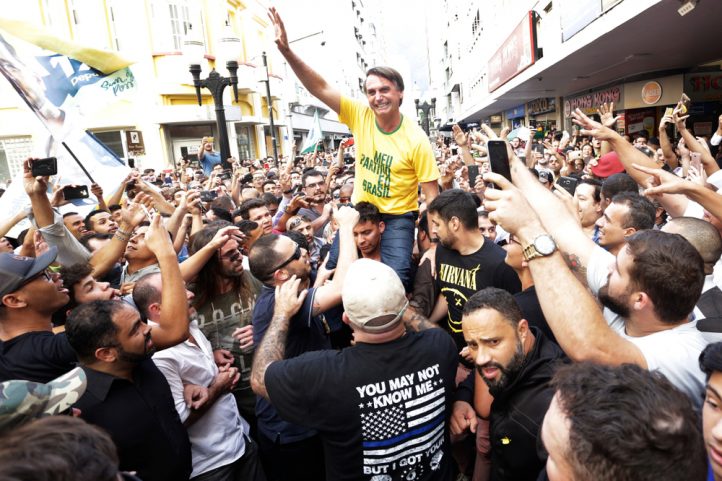by John Feffer
Less than a month ago, the candidate leading in the polls in the Brazilian presidential election was a jailed ex-politician who technically couldn’t even run for office.
It gets even weirder. Brazilian voters have put corruption near the top of the list of their concerns this political season. Yet Luiz Inacio Lula da Silva, the country’s most popular politician, has been jailed on corruption charges. And because of a law that Lula himself signed into law, politicians charged with crimes upheld by an appeals court can’t run again for eight years.
Weirder still, in a country where only 14 percent of the population has any confidence at all in Donald Trump’s global leadership, the voters have rallied around a candidate who’s often tagged the Trump of the Tropics.
When Brazilians went to the polls this Sunday, nearly half of them voted for this pro-Trump and anti-Lula candidate. Jair Bolsonaro is a free-market ideologue who frequently goes on homophobic, misogynist, and racist rants. He loves guns, torture, and autocracy. Brazilians who fear a return to military rule refer to Bolsonaro as “the Thing.”
Bolsonaro nearly won the race in the first round, coming only a few percentage points from capturing the simple majority required to declare outright victory. It’s remotely possible that the opposition could pull together for the second round, scheduled for October 28, just as the French did to deprive Marine Le Pen of the presidency last year.
But I doubt it.
Brazil is on the verge of being Trumped. And given the perilous state of the country’s economy — unemployment over 12 percent, extreme poverty on the rise, widening gap between rich and poor — Bolsonaro will wreak even greater devastation in Brazil than his gringo inspiration has already done in the United States.
The Thing’s political success in Brazil demonstrates that the radical right is far from peaking in its global influence.
Elsewhere in the world, the right has certainly mobilized resentment against neoliberal globalization. But that doesn’t explain the situation in Brazil. After all, Bolsonaro’s chief economic advisor, banker Paulo Guedes, adheres to the same University of Chicago philosophy that gave the world Augusto Pinochet’s brave new Chile in the 1970s. Thanks to Guedes, Bolsonaro has reversed his previously anti-liberal positions on economics. Now he promises widespread privatization and cuts in government spending, while also calling for fewer taxes.
I’m not sure that Bolsonaro’s supporters, aside from the very wealthy ones, are paying much attention to his economic program. What Brazilians are disgusted with is the status quo, which is corrupt and economically unsustainable. They don’t just want reform.
They want a Reformation.
Against the Globalists
In the sixteenth century, the Catholic Church aspired to control the world. Its influence spread well beyond Europe to the New World and, thanks to Jesuit missionaries, to Asia as well. Orthodox Christianity was well ensconced in Russia, and Islam controlled the Middle East and North Africa. But Rome was powerful, wealthy, and corrupt enough to compete with these rivals. The Pope commanded no armies, but he still claimed the allegiance of millions of people, including any number of kings and queens.
And then along came Martin Luther.
As a young monk and then a theologian, Luther absorbed the teachings of the Vatican. But he grew to despise what he saw as the corruptions of Catholicism, chiefly the sale of indulgences as a method of buying one’s way into heaven. His attacks on the Catholic order attracted a flock of like-minded protesters and reformers. And thus was born Protestant theology and the Reformation.
Luther challenged the globalists of his era, a political order based on a bogus and highly polarizing economic system (the sale of indulgences). He assailed the bureaucracy of this order, asserting instead that individuals could have a personal relationship with God without the mediation of the priests. He preferred the language of the people, rather than Latin, and translated the Bible into German.
Even before nationalism became a coherent ideology, Luther was asserting national prerogatives against the demands of the global (Catholic) order. He wasn’t a big fan of minorities either, considering the anti-Semitism of his treatise, “On the Jews and Their Lies.”
Luther also effectively deployed the technology of the era. The printing press, invented in Europe by Johannes Gutenberg around 1439, had become a tool of mass production by the early sixteenth century. Thanks to this new technology, Luther’s tracts and his German-language bible spread rapidly around Europe, undermining the Holy See’s authority.
Protestantism has proven to be an enduring phenomenon. As a schism, it has itself broken into dozens of denominations. But Catholicism, too, has endured. It has instituted some reforms, like Vatican II, and has become even more globalized since Luther’s time.
The Populist Reformation follows the same pattern as Luther’s earlier revolution. It targets a global elite. It criticizes a corrupt economic order. It speaks in a national language that the average person can understand. It uses the latest technologies — social media — to spread its message. It is full of fire and fury. And with Donald Trump’s victory in the 2016 presidential elections, it has spread to the very nerve center of the global order.
If it continues to follow the earlier example, this Populist Reformation will establish a powerful rival “church” that survives past the next election cycle. It may force some changes in the global order, but that order will survive as well. Protestants and Catholics generated one war after another in Europe. The current era looks to be equally contentious.
Modern Day Protestants
The modern-day Luthers are everywhere, railing against the globalists and tweeting their 95 theses around the world.
Eastern Europe is the center of this Reformation.
Poland’s Law and Justice Party and Hungary’s Fidesz are in firm control of their countries. In the Czech Republic, Prime Minister Andrej Babis, a corrupt media mogul, is trying to Berlusconi his country into submission, with the help of former leftist and current Islamophobe President Milos Zeman. In Bulgaria, the far right-wing United Patriots coalition named six ministerial positions as a reward for helping Prime Minister Boyko Borisov form a government. In Bosnia, the ultra-nationalist Miroslav Dodik was just elected as the Serbian member of the country’s unwieldy three-person presidency.
Elsewhere in Europe, the right wing is also on the rise — in control in Austria, sharing power in Italy, and racking up significant parliamentary numbers in Germany and Sweden. These insurgents are gearing up for the 2019 European Parliament elections in the hopes of securing a large enough minority to block legislation. “We are not fighting against Europe, but against the EU, which has become a totalitarian system,” the National Front’s Marine Le Pen has said. In France, the National Front polls just a fraction behind Emmanuel Macron’s ruling party.
On the borders of Europe, Turkey has been ruled for 15 years by a right-wing autocrat with an Islamist cast — Recep Tayyip Erdogan. Vladimir Putin, meanwhile, has been in charge in Russia for nearly two decades. This oligarch masquerading as a president aspires to create a vast conservative network — corrupt, anti-liberal, nationalist, and anti-immigrant — with Moscow at its center.
In Asia, right-wing nationalist Shinzo Abe is on track to become Japan’s longest serving prime minister. After winning his party’s presidency last month, Abe is expected to go after his long-sought prize: dismantling the country’s “peace constitution.”
Southeast Asia is full of right-wing militarists: in Thailand, Cambodia, and Myanmar. Rodrigo Duterte of the Philippines has a predilection for extrajudicial murder and other authoritarian policies that place him firmly among right-wing populists. The surprise presidential victory of 92-year-old Mahathir Mohamad in Malaysia in May suggests that this former authoritarian leader has figured out how to reinvent himself along populist lines. And, of course, Narendra Modi has been busy imposing his Hindu nationalism-inflected right-wing approach in India.
In Latin America, Bolsonaro is not alone. In Colombia, Ivan Duque won the presidential election last June. Like Bolsonaro, Duque embraces a neoliberal economic program of tax cuts and a pro-military approach to security. Daniel Ortega, though he started out as a leftist, has moved further and further toward right-wing clerical militarism in Nicaragua.
The wave of right-wing populism hasn’t completely covered the world. Mexico took a long-heralded turn to the left with the election of Andrés Manuel López Obrador. South Korean progressive Moon Jae-in is charting a new course for his country after 10 years of conservative rule. Jacinda Ardern is doing great things in New Zealand as is Katrín Jakobsdóttir in Iceland. More traditional conservative parties, like the Christian Democrats in Germany, are holding the line against the far right.
But globally speaking, that’s a drop in the bucket compared to the influence of the right-wing populists.
The Roots of Right-Wing Radicalism
Some of the countries that have shifted hard to the right have done pretty well economically in recent years, like Poland and the Czech Republic. But the populist parties that did well at the polls still managed to mobilize the resentment of those who didn’t benefit from that economic success. The task of appealing to the disgruntled is even easier in countries that haven’t recovered fully from the financial crisis of a decade ago.
The actual economic programs of the populists are largely immaterial. They might advocate some kind of welfare state. They might prefer, as in Brazil, the same kind of neoliberal nostrums that pass for orthodoxy among international financial institutions.
In general, however, the populists are interested in state capture: using the mechanisms of state power to enrich themselves and their circle of supporters. It’s crony capitalism raised to the nth degree.
Politically, the new right-wing populists are taking advantage of a widespread disgust for political elites. This disgust has been focused in particular on the corruption scandals that have engulfed so many countries. Because they’re focused on corruption, voters are willing to embrace candidates who are also members of the political elite and personally corrupt to boot — as long as these firebrands promise to “drain the swamp.”
But it’s perhaps hot-button cultural issues that provide the most direct method by which the right-wing populists can distinguish themselves from the competition.
Obviously this cultural populism takes different forms around the world. Duterte challenges the Catholic Church in the Philippines while Ortega embraces it in Nicaragua. But a common denominator is nationalism. It’s not just an outward-facing nationalism against globalists and immigrations. These right-wing populists deliberately stoke the anger of majority populations who somehow feel left behind by a world of greater equality and diversity.
Martin Luther King Jr. once envisioned a Poor People’s Campaign that brought together a rainbow coalition of the dispossessed. Right-wing populists have discovered an equally powerful coalition: the Privileged People’s Campaign that brings together rich and poor on the basis of the color of their skin, not the content of their character. King emphasized the importance of dignity. The insurgent populists make a similar appeal but to the dignity of the dominant race, class, or gender.
The left is compromised on all three grounds. It remains committed to multiculturalism. Once in office, it has often proven just as corrupt (or, at least, status-quo-oriented) as any other political bloc. And left parties have pushed forward economic globalization as vigorously as the right, if not more so — the Democrats under Clinton, Labor under Blair, the French Socialists under Mitterand, former Communist parties in Eastern Europe, and so on. No surprise, then, that None of the Above has become so popular.
What’s remarkable about many of the new right-wing populists is how long they’ve managed to hold onto power through the ballot box. Putin, Erdogan, Ortega: They’ve all been in charge for more than a decade apiece. Viktor Orban’s been the head of Hungary since 2010, Abe the head of Japan since 2012. Zeman has been the Czech president since 2013.
This Populist Reformation is no recent or temporary blip. Let that be a warning to the U.S. electorate. Even if Donald Trump manages to lose his reelection bid, the populist fury that produced his improbable 2016 victory is not going away any time soon.






It will be a very long-term fight. In the short term (2020 elections) try to push for Health Insurance for all, and secure social security. Long term, work with the youth, and try to deal with their needs, college loans, jobs. They are energized now and will continue the fight. The older members of the Populist Reformation will be dying off. Wild Card: The youth with only a High School diploma or less. They will see themselves (fairly accurately) was being useless to the society. No easy answers there.
“widespread disgust for political elites.”
Why on earth would anyone not have widespread disgust for political elites?
Now at some point in time it will turn on these populists. After all, if they stay in power for a long time, they themselves will be political elites.
And the public will certainly hold them in contempt eventually because political elites of all stripes are abject failures save for enriching their cliques
“The left is compromised on all three grounds. It remains committed to multiculturalism.”
I am not sure what this means. Multiculturalism, identity politics, etc. are empty signifiers. People voted for Trump because they hate Blacks and Latinos. If every university abandoned affirmative action, they would still have voted for Trump. Probably most of them would like to see Blacks sent back to Africa.
I am afraid that the author is wrong when considering Luther’s movement to be against the ‘globalism’ of that era. Maybe the term ‘hegemony’ or ‘existing order’ was correct unless we see ‘globalism’ to be equal to ‘hegemony’ that seems not to be a correct argument. Globalism welcomes ‘multilateralism’ while ‘hegemony’ doesn’t.
While both ‘reformist’ and ‘populist’ movements are against an existing order, but it doesn’t make them be considered equal as is the base in the current article. Reforms are ‘reason-based’ actions done from inside and with the means available by the same existing order as the case in Luther but populism is based on ’emotion’ and is usually in fight with existing order in all aspects.
In this light, it is natural for nations to be fascinated by populist leaders of other nations when they bring the populist games in international level. So when the people like one foreign populist they will find an internal copy! As Trump is essential an ‘American Ahmadinejad’ (in term of bringing populism concept to international level) so why Brazilians populism could not introduce a ‘Brazilian Trump’ and so on it could continue to run elsewhere that the social context is ready.